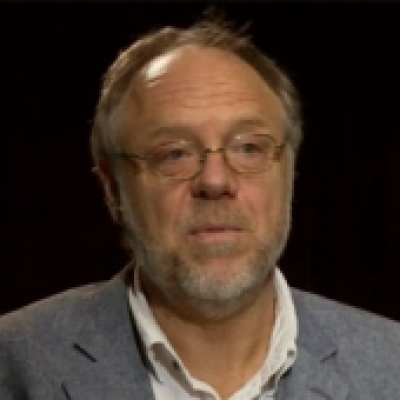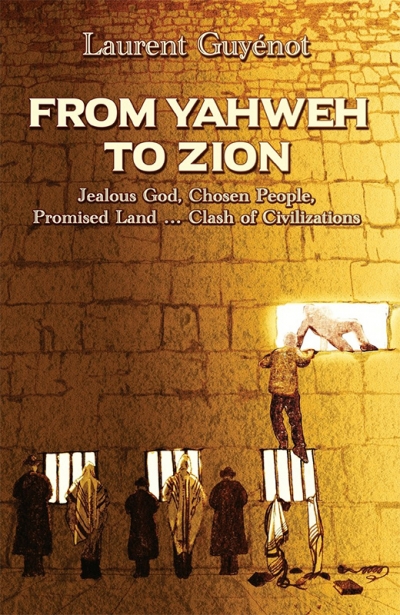



 Kevin Barrett
Kevin Barrett
From Yahweh to Zion: Jealous God, Chosen People, Promised Land… Clash of Civilizations by Laurent Guyénot (author), Kevin J. Barrett (translator); Pub: Sifting and Winnowing Books, Lone Rock, Wisconsin, 2018, 492 pages. Price: $29.95 Pbk.
Do Muslims have a Jewish problem, or just a Zionist problem? Clearly, the invasion and colonization of Palestine by Zionists, and the establishment of a self-proclaimed Jewish State there, is the central political problem facing the Muslim Ummah. But how “Jewish” is that problem?
Some argue that Zionists are just another sub-species of European settler colonialists. According to this interpretation, the Jewish identity of the squatters in Palestine is no more relevant than the British identity of settlers in colonial Kenya and Rhodesia, the Afrikaaner identity of settlers in South Africa, or the French identity of settlers in Algeria.
But all of those settlers have either packed up and gone home, or learned to live in legal equality with their native neighbors. Only colonized Palestine persists as an ethnic-supremacist European settler colony, dominating, subjugating, and expelling natives, and imposing apartheid conditions, in the 21st Christian century/15th Islamic century. What accounts for the seemingly anachronistic persistence of Zionist colonialism in an otherwise postcolonial era?
Gilad Atzmon points out that all other settler colonizers committed their crimes while flying the flag of a European home country. Only the Zionists embarked on a settler colonial enterprise without the official sponsorship of a particular European nation. Atzmon adds that other settler colonial projects were organized around the exploitation of native labor. But the Zionists are not especially interested in exploiting Palestinian workers. They want to get rid of the Palestinians, not put them to work. So for Gilad Atzmon and his followers, the Zionist project is a peculiarly Jewish effort. We cannot understand the “Jewish State,” he says, unless we understand Jewishness.
If we follow Atzmon’s lead, we must ask: what is it about Jewish identity, as it has developed over 2,500 years of history, that has created the peculiar — and peculiarly persistent — genocide in Palestine?
To ask this question is to court hysterical opprobrium. Any less-than-favorable mention of Jews, Judaism, Jewishness, or Jewish identity in today’s mainstream Western academia, media, or book publishing world is strictly forbidden. As John Cobb, one of the world’s leading Christian theologians, says in his blurb for Laurent Guyénot’s new book From Yahweh to Zion,
…we know that there is rather tight censorship with respect to what may be said about these matters without ad hominem response. The fact of Gentile crimes against Jews throughout history is used to justify this censorship, much, but not all, of which is self-imposed. In my view, through their role in this censorship, Jews are paving the way for the rise of anti-Jewish feeling and perhaps much worse.
I agree with John Cobb that certain Jews’ heavy-handed ad hominem attacks on their critics are fueling a dangerous backlash. The alt-right includes a growing number of people who are fed up with “Jewish power’s ability to silence discussion of Jewish power,” to paraphrase Atzmon. Some of these people are angry, chauvinistic, and potentially dangerous. In the past, such anger has led to violence against innocent Jewish people. To forestall its possible recrudescence, we need to discuss the most sensitive topics — not censor them and thereby relegate them to the neo-Nazi corners of the internet.
It is in hopes of fostering a reasoned interfaith dialogue on these matters that I agreed to translate and publish Laurent Guyénot’s From Yahweh to Zion, which I believe may be the best book ever written on what used to be called “the Jewish question.” Dr. Guyénot, a PhD medievalist historian by training, explores many legitimate “Jewish questions,” including: Is Judaism/Jewishness a religion or an ethnicity? What is the Jews’ relationship to God and the prophets? What accounts for the Jews’ ability to maintain tribal cohesion over more than 2,500 years? Why have Jewish communities so often been at odds with their non-Jewish neighbors? Why have Jews been overrepresented — in many non-Jewish societies throughout history — in positions of wealth and power? Why does this overrepresentation seem to be increasing today? Why is this issue off-limits for discussion in polite company (including the mainstream media and the academy)? Is Jewish tribal cohesion an important factor in the deep xtate? And what role does the creation and endless expansion of Israel play in all of this?
Dr. Guyenot’s thesis, in a nutshell, is that a tiny Jewish elite, representing a very small fraction of Jews, has hijacked the idea of God and turned it to their own aggrandizement. Over two-and-a-half millennia, this elite has terrorized its own people to enforce their sense of separateness from other groups, garnering wealth and power in the process. Today, much of the Jewish population neither believes in God nor practices most of the prescribed Jewish rituals. But the terrorizing of Jewish people by their own leadership, the enforced sense of separation from other communities, and the amassing of wealth and power by the Jewish elite whose prime weapon is the adaptation of millennia-old brainwashing processes to today’s secular setting, all continue — with Israel replacing Yahweh as a central focus of worship.
From Yahweh to Zion is the work of a historian not just of facts, but also of ideas. The book’s exploration of 2,500 years of Jewish history will shock many believing Jews and Christians with its unfavorable interpretation of the Torah, the central Jewish holy book that Christians have included in the Old Testament. Since both traditional Jews and Christians consider the Torah/Old Testament to be inerrant scripture, Guyénot’s exposure of that book’s all-too-obvious immorality will challenge and discomfit many readers (two traditional Catholic friends and colleagues of mine have refused to review the book for that reason).
In a recent radio interview with me, Dr. Guyénot, who is a non-doctrinaire Christian, noted that Muslims are in a better scriptural position to embrace his insights than are Christians and Jews. He was alluding to the notion of tahrif: the Qur’anic doctrine, backed up by numerous hadiths, holding that the Torah (like the Zabur and Injil) was originally an authentic divine message, but that what survives today is the product of alteration and distortion by human transmitters.
Guyénot’s historical analysis suggests that the original distorters of the Torah’s divine message were what he calls the Yahwist priesthood. This priestly elite shaped the message to favor its own self-interest. They drummed up followers by casting Yahweh as a tribal god, merely one god among many, who would bring his followers good fortune if they punctiliously obeyed “his” orders (which were actually the orders of the priests themselves, and often involved plundering other tribes). Later, the priesthood learned to play the double game of making Yahweh a tribal god for the tribe, and a supposedly universal god (who still favored Jews as the Chosen Ones) for everyone else.
The Qur’an abolishes this priesthood of con-artists, and indeed all priesthoods. It corrects many of the Torah’s stories to make them moral rather than immoral or questionably moral. It restores the true picture of the one universal God. It insists we are equal before God, that the only meaningful distinction between people is in their degree of God-consciousness and goodness, not their tribal affiliation or material wealth. And it corrects the Jews’ erroneous portrait of life as a purely material this-worldly affair by insisting that the next world’s rewards are better and more enduring.
So from a Qur’anic perspective, there are indeed “Jewish problems.” Laurent Guyénot’s interpretation of how these problems have manifested in history, culminating in the present apotheosis of Zion and accompanying War on Islam, is an essential contribution to a critically-important conversation.
